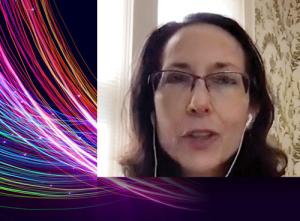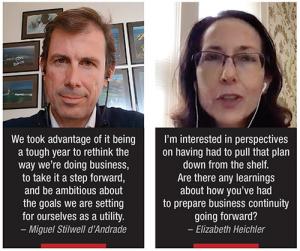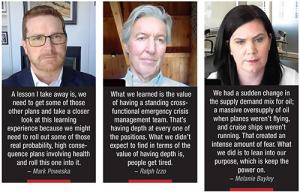Global Electrification Forum
Moderator Elizabeth Heichler is the Executive Editor of MIT Sloan Management Review. Miguel Stilwell d’Andrade is the CEO of EDP Group. Mark Poweska is the CEO of Hydro One. Melanie Bayley is President, Electricity at ATCO. Ralph Izzo is the CEO of PSEG.
Energy and utilities companies must navigate the convergence of several crises including pandemic, climate, and economic, as the world continues to recover from COVID-19 and begins to confront the challenges ahead. During this session at EEI's Fifth Annual Global Electrification Forum, panelists shared perspectives on risk management under uncertainty, and how leaders can turn inflection points and disruptions into opportunities while moving through a transformational decade.

Moderator and Executive Editor, MIT Sloan Management Review, Elizabeth Heichler: The past year has been challenging for business leaders. Tell us about a great internal challenge you've had to grapple with, as well as significant external challenge.
CEO, EDP Group, Miguel Stilwell d'Andrade: It has been a tough year but if I had to choose one thing that I am particularly proud of it's this. We were able to keep all of our people safe and healthy throughout this year. That was a challenge.
It's certainly something that was unforeseen and was tossed at us, as a global economy and as a set of companies. We were able to react quickly within less than a week, to get more than seventy percent of our people working from home and continue to run the business.
We provide energy to over ten million customers globally — Europe, the U.S., and places like Brazil. We're able in a short amount of time to get everyone home. We're keeping thirty percent of our field force on the ground and are able to quickly ramp them up and give them the necessary safety gear. We've kept everyone working also on this new shift paradigm.

Globally, we have the infrastructure in place, both from an IT perspective and technology. That was something we were particularly proud of as an organization. We were able to keep driving the business forward and we had a good year as a company. We revised our business plan and are doubling our growth and renewables globally.
In the U.S. we committed to going all green by 2030. We committed to going coal free by 2025. We took advantage of it being a tough year to rethink the way we're doing business, to take it a step forward, and be ambitious about the goals we are setting for ourselves as a utility.
CEO, Hydro One, Mark Poweska: It's about how our people stepped up. I'm proud of the people in the organization, and the pandemic presented a lot of challenges to companies, ours included. It's important for communities we operate in to support customers, and I was proud of the creativity our team came up with.
We were the first utility in Ontario to offer a pandemic relief program for our customers. We returned all the security we have from our business customers. We gave their deposits back to them. We launched a Connected for Life program, which is a promise to our customers not to disconnect them.

Later, we had a percentage of our workforce that had to go home. We had to worry about keeping the rest of our workforce, who was still out there, safe amongst uncertainty around what the protocols were. That presented challenges because at the beginning we were all learning along the way.
That presented communication challenges with our employees, being spread out over hundreds of communities. We overcame it through the use of technology and innovation. It is about how the Hydro One team kept up for customers and communities including First Nations.
President, Electricity, ATCO, Melanie Bayley: We're in Canada. The ATCO Group of companies is involved in many businesses, energy infrastructure, both electric and natural gas utilities, structures, and logistics, and we are headquartered in Calgary, in Alberta. I look after our electric utility in Alberta, the Yukon, and the Northwest Territories in Canada's North.
In Alberta we are in the heart of Canada's oil and gas industry. Decarbonization efforts are significant in our country like they are in many places in the world, but today the oil and gas sector remains a significant contributor to Canada's GDP. Being a utility with our footprint in Northern and Southeastern Alberta, a significant amount of the load on our system comes from the oil and gas sector.
I give all that context to set the stage for the challenges we have because, when the pandemic hit, we were dealing with the same health crisis everyone's dealt with, so I won't repeat that, but we had a sudden change in the supply demand mix for oil; a massive oversupply of oil when planes weren't flying, and cruise ships weren't running anymore.
We had negative oil prices in Canada and the oil and gas industry marginally shut in, so at the same time we are experiencing these real pressures from the pandemic and over people going home, we had our largest customer segment very suddenly, almost overnight, drop off.
It's not as doomsday as I make it sound. The prices did recover through the summer last year and we're in a good place now, but that experience created an intense amount of fear and uncertainty in the people of our organization.
At the same time, we are asking them to completely turn things on in their heads and go do their jobs quickly in a different way. Either you're working from home or you're still out in the field, but here are all the new protocols you have to follow to do your work in the field.
This session's about leadership, so I won't focus on the strategies and our tactical approach to that demand destruction, but more about that uncertainty that people feel, and what it takes to pull them along with you and remain positive and optimistic in the face of that kind of challenge.
We focused on being there with our employees to the greatest extent we can in a situation like this, where we are on screen with them, we have a plan, are a part of it, and together we can do this.
We can get through this. That's what I'm most proud of, is that we did. We were able to keep our employees with us. Many of them, their spouse, friends, and families were being laid off or furloughed, who work in the oil and gas industry, so there was a lot of trepidation.
What we did is to lean into our purpose, which is keep the power on, but seemed like the one thing that we can do to help keep normalcy in people's lives when everything else was not normal.
Leadership needs to always be grounded in our purpose and living through your values. We all work for corporations that have likely strong values. We're not all going to have the same values, but leaning into that is what gives, at least for unscathed employees, a sense of confidence, as we went through the uncertainty.
CEO, PSEG, Ralph Izzo: While we have all sorts of procedures, manuals, and practice sessions to handle major events, I don't think anything can prepare an organization for something that was as far reaching in its consequences.
There was not one aspect of our operations that wasn't affected, whether it's a nuclear refueling outage, or getting the SEC documents out, nor was there ever anything in our rehearsals that would have anticipated the duration of something like this.
I see tremendous breadth in terms of functions affected and time frame. What I'm proudest of is the fact that we kept the lights on, and we kept the gas flowing, with sadly, unfortunately, health impacts that mirrored the population. I wish we'd done even better than that, but I'd leave it there.
Moderator, Elizabeth Heichler: I'm interested in perspectives on having had to pull that plan down from the shelf. Are there any learnings about how you've had to prepare business continuity going forward? Of course, plans never match up to reality.
CEO, PSEG, Ralph Izzo: What we learned is the value of having a standing cross-functional emergency crisis management team. That's having depth at every one of the positions. The depth was originally designed with the expectation that at any point in time, if the team is made up of some number of people in the low double digits, that one or two folks won't be around, and that of course turned out to be true. What we didn't expect to find in terms of the value of having depth is, people get tired.
If you're meeting every day for three hours and you're doing this for fourteen months, you better have depth there, because over the course of fourteen months you need some rotations. After that, the script had to be edited and modified for circumstances.
CEO, Hydro One, Mark Poweska: All of us have emergency management structures in place. I don't think any of us contemplated they would be in place for a year and a half. We had to adapt them. Because of the nature and the criticality of this industry, we do have to put planning in place. We practice things. Our pandemic response plan is low probability of high consequence events like this.
You write a plan. You put it in place. You kind of look at it. I don't think we ever thought we would have to pull it off the shelves, frankly. What you learn is, it's good to have a starting point, but absolutely, you have to adapt it along the way.
A lesson I take away from that is, we need to get some of those other plans and take a closer look at this learning experience because we might need to roll out some of those real probability, high consequence plans involving health and roll this one into it.
It has challenged the normal way of thinking of emergency management structures and protocols, because most of the plans are not set up for being replaced. Imperative for us was that there was clarity in what the principles and the goals were, that we're making decisions along the way, because everything changed quickly.
We set two principles. One is to protect our employees, and the second is to continue to energize our customers in Ontario, and that allowed us to drive decision making now so we'd be more adaptable to changes along the way.
CEO, EDP Group, Miguel Stilwell d'Andrade: It shows that some of these contingency plans are kept in a drawer, and you expect never to use them. Over the last twelve months, we had not just COVID, but we had a cyberattack, fortunately without any serious consequences.
We also have over a thousand megawatts of wind power down in Texas, and we got the polar vortex. In the same twelve months we've had all these extreme events, which you don't expect to have.
The polar vortex was an extreme event. Cyberattack is not an extreme event, but when you get hit by one, you're not a hundred percent prepared, or you hope you're prepared, but you're not at all sure how things are going to react.
It shows that having resilience built into the system, having prudent risk management, redundancies built in, that's important, particularly for critical infrastructure, for companies that are managing such an important infrastructure of the economy.
If you don't have resilience, if you don't have prudent risk management, you get hit by what seems to be a once in a hundred-year type of event, but they do happen. It shows that it pays to prepare, and in that sense, fortunately, it's gone well so far.



